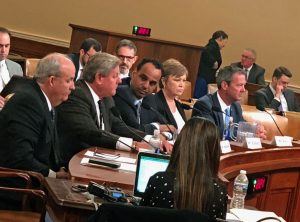Renewable Fuels Association General Counsel Ed Hubbard urged the committee to extend the Second-Generation Production Tax Credit and Accelerated Depreciation rules at least until the end of 2018. “While the U.S. grain-based ethanol industry has matured into an efficient and highly competitive fuel supplier, the second-generation sector is much younger, and has struggled to overcome immense financial and commercial obstacles,” Hubbard told the subcommittee. RFA further urged Congress to modify and extend the Alternative Vehicle Refueling Property Credit.
Listen to Hubbard’s opening statement here: Ed Hubbard, RFA
Cal Meyer, chief operating officer of Ag Processing Inc. (AGP), testified on behalf of the National Biodiesel Board (NBB) with a simple message. “We urge Congress to renew the biodiesel blender’s tax incentive through 2018 at a minimum, while considering a multi-year approach,” he said, citing the many benefits provided by the advanced biofuel.
Listen to part of Meyer’s opening statement. Cal Meyer, AGP, for NBB
Advanced Biofuels Association (ABFA) president Michael McAdams also testified at the hearing on behalf of convenience store and truck stop operators, truckers and fuel retailers. In his testimony, McAdams stressed the need for the biodiesel and renewable diesel blenders credits to be extended through 2018. “This cycle of uncertainty that causes lower biodiesel RIN values as we await the tax credit extension must be broken, and prospective certainty must be afforded for the credit to achieve its true economic punching power.”
Michael McAdams, ABFA

